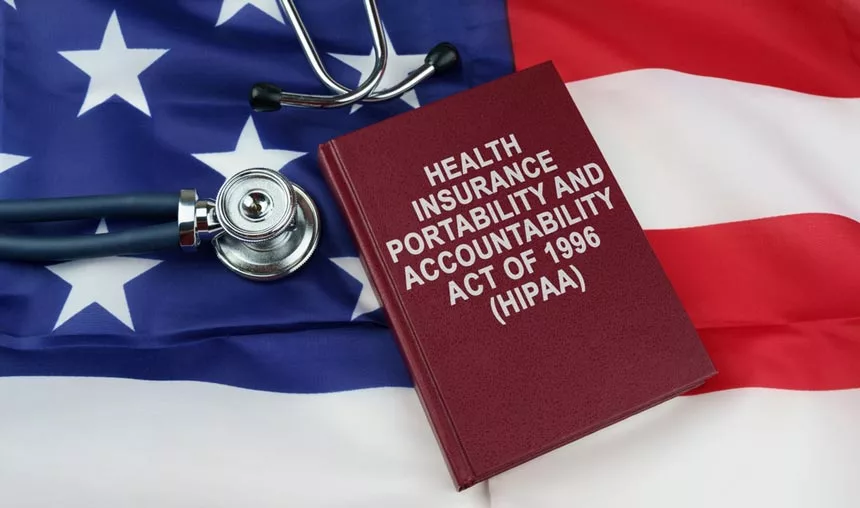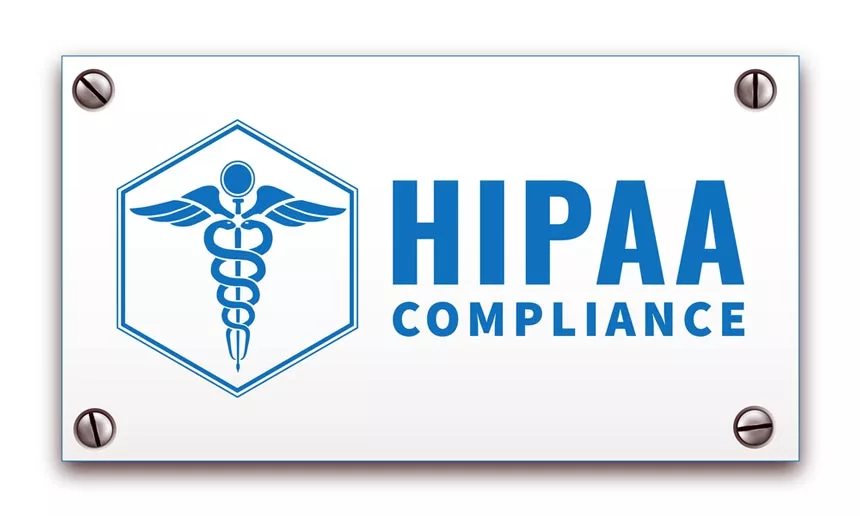What is HIPAA & How to Get HIPAA Certified
If you are looking to do business with healthcare organizations, you will first need to become HIPAA compliant. This means understanding how to navigate this process, what is entailed with being HIPAA compliant, and how you can show the organizations you wish to work with that you have all the necessary safeguards needed to protect any private or personal information you are given access to through your clients.
Keep reading to learn more about HIPAA certification, and how to ensure your privacy and confidentiality are upheld by your healthcare and rehab service providers!
What is the Health Insurance Portability and Accountability Act?

For those struggling with a drug or alcohol addiction, it is not uncommon to avoid seeking out professional help out of fear that they may face judgment. However, this does not have to be a roadblock on their path to recovery. There are laws in place to help keep your medical information and records private, including any treatment you receive for a substance addiction.
The Health Insurance Portability and Accountability Act of 1996, or HIPAA, is a federal law put in place to protect patient privacy and make sure their sensitive health information will not be disclosed or shared with other parties without their consent.
HIPAA was initially implemented as a method of improving the portability and accountability of coverage provided through insurance, particularly for employees covered through their jobs. Over time, this act grew to include privacy and security rules for individuals’ Protected Health Information (PHI) in their medical records.
What is Considered to be Protected Health Information?
When understanding what can and cannot be shared under the HIPAA privacy rule can help to know what is considered to be Protected Health Information. This can include an individual’s:
- Demographics.
- Current and past health status.
- History of where they have received care.
- Method of paying for treatment.
In order to strengthen HIPAA rules surrounding privacy and confidentiality, the US Department of Health and Human Services (HSS) established a Privacy Rule for the act, which requires all healthcare and insurance providers and any other covered entity to follow in order to maintain their HIPAA compliance certification.
What Is HIPAA Compliance?
HIPAA compliance is the process of ensuring that organizations and individuals are adhering to the standards set forth in the HIPAA Privacy Rule and the HIPAA Security Rule. The HIPAA Privacy Rule defines how patient health information (PHI) is used and disclosed, while the HIPAA Security Rule requires organizations to implement physical, administrative, and technical safeguards to protect the privacy and security of PHI.
Addiction Rehab Confidentiality and HIPAA Compliance
Under HIPAA regulations, those seeking addiction treatment services are entitled to the same protections as those receiving other forms of medical care. In fact, these individuals actually have additional protections under the Code of Federal Regulations. This HIPAA security rule was created to help with concerns over using previous substance history in domestic or criminal cases.
Disclosing this information without the person’s consent is considered to be a security violation, as well as a potential barrier to treatment that may have negative consequences on those who are struggling with a substance use disorder.
What Does it Mean for a Rehab Facility to be HIPAA Certified?

When a rehab facility is HIPAA certified, this means that their patients’ records are protected under Federal law and legal obligations. Generally, these facilities can not refer to their clients as patients outside of the treatment center, or release any patient information regarding their client’s substance abuse unless they have:
- Their client’s written consent.
- The facility has a court order allowing this disclosure.
- The information is being disclosed to medical personnel and healthcare workers in the event of a medical emergency or for research, auditing, or evaluating personnel for qualifying reasons.
Failing to maintain compliance with or violate these regulations is considered to be a crime. Any suspected HIPAA violations should be reported to the proper authorities. In most cases, upon enrolling into a rehab program, you will be informed of the HIPAA policies protecting your information during your admissions process.
You will most likely be required to sign paperwork stating that you understand the HIPAA requirements and regulations for your treatment before starting your rehabilitation process, so it is important to do your due diligence and read over these forms carefully.
Consent Forms Provided By Rehab Facilities
Rehab consent forms are documents used by addiction treatment facilities, and several other programs within the healthcare industry, to ensure a person’s informed consent for treatment. These forms typically outline the rights of the patient, provide information about the treatment, and outline any potential risks associated with the treatment.
They also provide a way for the patient to agree to the treatment and any related activities. These forms are designed to ensure that the patient is aware of their rights and responsibilities as part of their treatment. They typically include a description of the treatment, information on potential risks, and the patient’s right to refuse or withdraw from treatment, as well as making all parties aware of the privacy policy of the facility or organization.
Just as these forms may be used to protect the patient, they may also be used to protect the treatment facility. These can provide a way for both parties to understand the risks associated with the treatment, as well as the responsibilities of both the patient and the provider.
These are important documents that should be reviewed carefully by the patient and the treatment facility. These forms should be kept on file for future reference and should be updated regularly. It is important for both the patient and the treatment facility to understand the terms of the consent form and adhere to the guidelines outlined in it.
The HIPAA Certification Program & Getting HIPAA Compliant

Becoming HIPAA certified is an ongoing process that requires organizations to assess their current compliance program, create a plan for compliance, and regularly monitor and update their HIPAA compliance software and standards.
Here are the steps healthcare providers and organizations should take to become HIPAA compliant:
- Assess Current Compliance Program: Organizations should begin by performing a thorough assessment/security standards audit of their current HIPAA compliance program. This assessment should include an evaluation of the physical, administrative, and technical safeguards that are in place to protect PHI, as well as an assessment of the policies and procedures that are in place to ensure HIPAA compliance.
- Create a Compliance Plan: Organizations should then create a comprehensive compliance plan that outlines the steps they will take to achieve HIPAA compliance and maintain this status. This plan should include specific policies and procedures that address the areas identified in the assessment, as well as the roles and responsibilities of each person involved in the compliance process.
- Implement the Compliance Plan: Once the compliance plan has been created, organizations should begin to implement the plan. This includes providing complete HIPAA training on the act’s rules and regulations with staff, implementing any necessary technical safeguards, and creating policies and procedures to ensure compliance.
- Monitor and Update Compliance: Organizations should regularly monitor and update their HIPAA compliance program. This includes conducting regular audits, reviewing policies and procedures, and training healthcare workers and staff on any new regulations or changes to the compliance program.
By taking the steps outlined above, organizations can ensure that they are compliant with the HIPAA Privacy Rule and the HIPAA Security Rule. Becoming HIPAA compliant is a complex process, and organizations should consider working with a third-party HIPAA compliance specialist to ensure they are in compliance with all applicable regulations.
FAQs on the HIPAA Certification Process
Why Is HIPAA Compliance Important?
HIPAA compliance is important for businesses and organizations that handle PHI because it helps businesses and organizations protect the privacy and security of sensitive health information. Organizations that are not compliant with HIPAA training and best practices can face significant fines, penalties, and even criminal charges.
How Long Does HIPAA Certification Last?
When it comes to protecting health information, the Health Insurance Portability and Accountability Act (HIPAA) is the gold standard. But understanding the ins and outs of HIPAA certification can be a challenge. So how long does HIPAA certification last?
HIPAA certification is an ongoing process and is not typically a one-time event. The certification process is designed to ensure that organizations are compliant with all HIPAA regulations, which includes regular training and monitoring of staff for HIPAA compliance.
How is HIPAA Certification Maintained?
To maintain HIPAA compliance, organizations must comply with the HIPAA Security Rule and Privacy Rule. This includes implementing security measures to protect the privacy of Protected Health Information (PHI) and making sure that all employees are trained on HIPAA regulations. Organizations must also regularly review their policies and procedures and update them as needed to be compliant with HIPAA.
The exact length of how long a HIPAA certificate lasts depends on the organization and its specific needs. Generally speaking, organizations should complete a comprehensive HIPAA compliance review every two years. This review should include a comprehensive audit of the organization’s security and privacy policies and procedures, as well as a review of all employee training.
Are There Circumstances Where My Information Can Be Shared Even Under HIPAA Compliance?
The basic rule of HIPAA is that covered entities cannot share PHI without permission from the individual, or in some cases, a family member or legal representative. However, there are certain circumstances in which protected health information (PHI) can be shared, even under HIPAA compliance. These circumstances include the following:
- Treatment, Payment and Health Care Operations: Covered entities are allowed to use or disclose PHI for the purposes of treatment, payment and health care operations. For example, a doctor can use a patient’s PHI to diagnose and treat the patient, or a health plan can use the PHI to process a claim.
- Disclosure to Family and Friends: Covered entities may disclose PHI to a family member, friend, or other person involved in the patient’s care, provided that the patient has given verbal or written consent.
- Disclosure to Public Health Authorities: PHI may be disclosed to public health authorities in an official healthcare setting.
The Importance of Privacy for Addiction Rehabilitation
Addiction is a complex condition that requires extensive rehabilitation to overcome. Many individuals struggling with addiction are hesitant to seek treatment due to the stigma associated with the condition. However, privacy is an important factor to consider when seeking addiction rehabilitation.
Rehabilitation centers must ensure that each patient’s information is kept confidential and secure. A sense of privacy can provide comfort and reassurance to individuals struggling with addiction, as they may feel ashamed to discuss their struggles openly. Privacy also helps protect individuals from potential discrimination or judgment from their peers.
Having a safe and secure environment encourages patients to be open and honest about their struggles, which is essential for a successful recovery. This is why it is important for addiction rehabilitation centers to provide a sense of anonymity to their patients.
Many individuals may be embarrassed to admit that they are seeking help for addiction. Having the option to remain anonymous can provide comfort and reassurance to those seeking treatment.
Finally, addiction rehabilitation centers should ensure that their policies and practices are designed to protect the privacy of their patients. This includes not sharing any information about an individual’s diagnosis or treatment without their consent.
Privacy is an essential factor to consider when seeking addiction rehabilitation. It is important for rehabilitation centers to provide a safe and secure environment for their patients to ensure a successful recovery.
Find Private and Effective Rehab Programs Nationwide Today!
Now that you understand what it means to be HIPAA certified and how this can protect your information when receiving treatment, you may be ready to get the help you need without fear of judgment.
The Find Addiction Rehabs team works with an extensive list of effective and diverse treatment centers and is dedicated to helping you find a rehab facility that can meet all of your care needs. Call our 24/7 hotline now, and we will help you get started on your path to sobriety, today!

